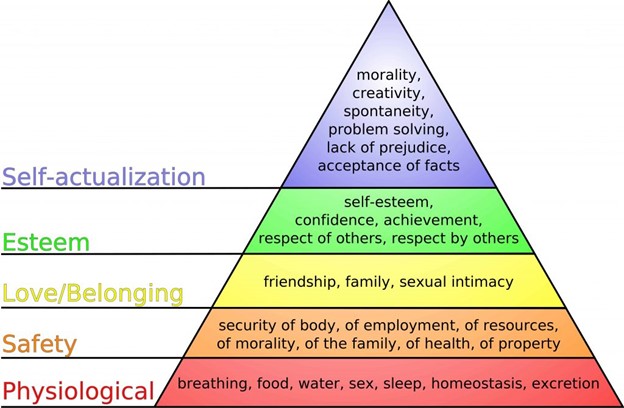By: Suzanne Marriott
I remember when my therapist reminded me that my husband was often in survival. She was referring to the most basic of human needs as defined by Abraham Maslow in his Hierarchy of Needs.
I had been complaining that my husband no longer seemed interested in the things that usually drew us together—like reading and discussing new books or exploring new concepts. Increasingly, I was feeling alone and disconnected from my husband.
Abraham Maslow was an American psychologist who theorized that humans have five primary categories of needs: physiological, safety, love/belonging, esteem, and self-actualization. Though controversial, his elucidation of conditions rings true in many ways and, as a caregiver, I found them helpful.
When my therapist spoke of my husband being in survival, she was referring to the basic physiological needs, such as breathing, food, water, sleep, sex, and maintaining consistent levels of these essentials. Suffering from MS, my husband was not at all confident that these needs were or would be met. He could no longer work and was becoming increasingly dependent on me. Even sex was problematic.
Where once he had felt safe and secure, his second basic need—safety—was no longer assured. His body was changing, and his health was deteriorating. Working was out of the question now, and our financial resources were being stretched. He didn’t feel safe at all.
Though he felt my love and we had a strong sense of belonging together, his social connections were becoming increasingly limited as friends fell away and his mobility issues limited where he could go and what he could do. He no longer belonged to his work community and his involvement in the larger community was diminishing.
His self-esteem was on a downward trajectory. He was losing confidence in himself now that he could no longer work. This led to a lowering of self-respect, and he wondered if others respected him as much as they once had now that he was becoming “different.”
In terms of self-actualization, it was becoming more and more difficult for him to accept the facts of his drastically changing situation. He wondered who he was now and who he would become. Fortunately, he nourished his creative side through drawing and painting in his journals and taking photographs that he enjoyed editing on his computer. Here he could be imaginative and spontaneous. This gave him relief from his worries and a growing avenue for self-actualization. Creativity was a wonderful coping strategy that helped him relieve stress and live in the moment. It was both satisfying and empowering.
Meeting these needs, as outlined by Maslow, is linked to our sense of well-being. When they are not met, our sense of well-being diminishes. Add this to the physical pain and limitations of the disability, and it was no wonder that my husband and I were sometimes out of sync.
My challenge was to continue nourishing my own self-esteem and growth in self-actualization while recognizing that often my husband would be preoccupied with much more basic needs. With this knowledge, I became more compassionate when he was anxious and moody, and I appreciated and encouraged his creative pursuits. I also found that being a caregiver helped me to meet my own higher needs as identified by Maslow. While my physiological and safety needs were well enough met—or else I would not have been able to do all that I did for my husband—caring for him brought us closer together in love and belonging. As I grew more as a caregiver, I grew in confidence and achievement, and this increased my self-esteem. For me, caregiving became a new way of self-actualization as I became creative in my role as a caregiver, learning to solve new problems and accepting the facts as they emerged while finding ever-new ways to live fully in the moment.
About Suzanne
Suzanne Marriott’s memoir, Watching for Dragonflies: A Caregiver’s Transformative Journey, tells the story of the ten years she cared for her husband who suffered from multiple sclerosis. Suzanne holds a BA in English, an MS in Education, and an MA in Transpersonal Psychology. Her interests include wisdom practices and mystical experiences, Jungian psychology, spending time in nature, and travel. Suzanne lives in an ecologically conscious cohousing community in the Sierra Nevada foothills in California. Connect with Suzanne at https://suzannemarriottauthor.com and www.facebook.com/suzannemarriottauthor.


